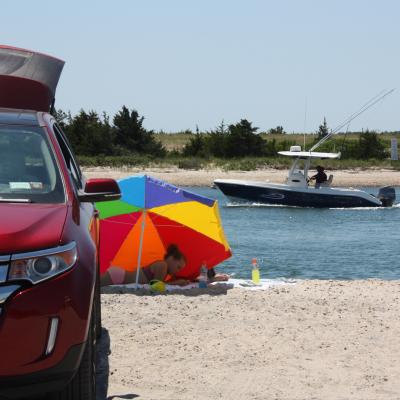Beach Battles Rage On

“Why the hell can’t we get along?” Trustee Jim Grimes asked, frustration evident in his voice.
The East Hampton Town Trustees were well into a second consecutive meeting that would surpass the three-hour mark, much of the previous meeting’s agenda similarly held hostage to long and acrimonious public comment over claims to private ownership of beaches. The group’s two June meetings followed a May 23 meeting at which two residents of Springs insisted that vehicles be restricted from neighborhood beaches.
The tension reached a boil on Tuesday, as the Springs residents, Penny Helm and Susan Winkler, and the trustees resumed the debate, interrupting and talking over one another repeatedly. “Does anybody get along with their neighbor here?” Mr. Grimes finally asked, turning to the audience, which also included many residents of the Driftwood Shores development in Springs, where newly arrived homeowners are asserting ownership of the beach in front of their house. “Can we have someone, please?”
The recently concluded trial to determine the ownership of and access to parts of the Napeague ocean beach, the dispute among the Driftwood Shores property owners, and the insistence of Ms. Helm and Ms. Winkler that vehicles be further restricted have exasperated the nine-member board, which generally considers public access to the beaches, including vehicular access, an inalienable right.
But like other complaints leveled in recent years, including rampant quality-of-life infringements and ecological degradation of beaches and water bodies, these conflicts and breakdowns in civility are promoted by the overwhelming numbers of people crowding into the town in summer. Mr. Grimes was not the only speaker on Tuesday who begged for compromise, understanding, and accommodation.
“All we’re looking for, each of us, is our own little space,” Ms. Helm told the trustees, in asking that a fence be replaced at the small beach inside the channel at Maidstone Park and vehicle access restricted. She said trucks were damaging the beach and beach grass, and presented a hazard for the children and families who swim there.
Tim Bock, a trustee, was unmoved. “You’re saying there’s a safety issue,” he told Ms. Helm. “Has there been one reported? No! There’s never been one reported there, ever.” With respect to residents driving on the beach, he asked, “Who are you to say they’re not entitled?”
Many of the trustees agreed that one of Maidstone Park’s two vehicle access points has been widened to 50 feet or more and should be narrowed, but said both should remain, along with a pedestrian access. As they have done previously, they reminded Ms. Helm of the town-owned beach directly across from the parking lot, where vehicles are prohibited.
Ms. Winkler told the trustees she was “horrified” by the number of trucks at Little Albert’s Landing Beach in Amagansett. “It’s such a narrow beach that almost all the trucks park with their front end right up into the dune,” she said. “The trucks go all the way from the grass into the water,” impeding, she said, pedestrian use. “People always talk about the beauty of our beaches. We are destroying the beauty of our beaches by allowing this to happen.”
“Historically, they’ve also had access,” Francis Bock, clerk of the trustees, said of beach drivers. “You can’t just take it away from them.” A solution, he said, would be to expand vehicle access to other areas, “to stretch them out a bit, as opposed to consolidating them into little tiny areas, where they do damage.”
The clerk said that in his 60 years, “I cannot think of one beach that exists today that did not exist back to my first memory. . . . The population has expanded four or five times, and we’re still playing with the same small spaces we had when I was born. And we wonder why everybody’s fighting over it. Every town board that goes through here, nobody wants to address it.”
Tim Taylor of Citizens for Access Rights said that many compromises were made in crafting the town code sections pertaining to beaches. “Consideration was given to all user groups,” he said. “Now, it seems like people are coming back for a second bite at the apple. . . . I respect everybody’s right to not agree with everything, but what we take exception to is people banning other people from activity that they don’t like.” Vehicle access to beaches, he said, “is a traditional use we’d like to see protected in East Hampton.”
The trustees acknowledged the difficulty in finding a balance that accommodates everyone. “The best thing that starts here is recognizing some of the other people’s positions,” Mr. Grimes said. “It’s not all you. There are other people out there. . . . Reflect on this, and have some middle ground. There’s going to be places where people are going to park their trucks, they want to picnic with their kids, it’s legal. You may not like it, but it is legal. There are areas where the trucks are excluded, and rightly so.”
Several residents of Driftwood Shores returned to thank the trustees for investigating the ownership of their neighborhood’s bay beach. They also informed the trustees, however, that attempts to resolve the dispute amicably had proved hopeless. Before they had even left the Town Hall campus after the last trustees’ meeting, they reported, they had argued in the parking lot with the couple asserting ownership of the beach in front of their house.
Richard Whalen, the trustees’ attorney, said he had contacted a company that would try to ascertain if any deed transfers, going back to the town’s original land allotments, had improperly extended property rights to the high-water mark. “No one can convey title to more land than they own,” he said. “That was true in 1830, as it is today.”
The solution to these disputes, Mr. Grimes repeated, “is, people getting used to sharing the resources.”
But “nobody wants to share anything anymore, Jim,” the clerk responded. “Everybody is about themselves.”
